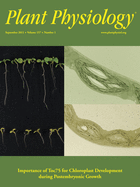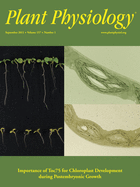
Cover image

On the Cover: Chloroplasts play vital roles in photosynthesis and various other metabolic processes, and their development depends on the import of thousands of nucleus-encoded proteins from the cytosol. The chloroplast β-barrel proteins Toc75 (Translocon at the outer envelope membrane of chloroplasts, 75 kD) and OEP80 (Outer Envelope Protein, 80 kD) are both members of the Omp85 superfamily, whose constituents are ubiquitously distributed in the outer membranes of gram-negative bacteria and mitochondria as well as in plastids. Toc75 functions as a translocation channel during chloroplast protein import, whereas the role of OEP80 remains uncertain. Both proteins are essential because Arabidopsis (Arabidopsis thaliana) knockout mutants abort during embryogenesis, a fact that has, until now, precluded functional, in vivo studies in plants. In this issue, Huang et al. (147–159) describe the use of dexamethasoneinducible RNA interference to circumvent this problem by silencing the expression of the proteins in Arabidopsis plants. The results reveal that both proteins are important for the normal development of chloroplasts and nonphotosynthetic plastids during postembryonic growth. Similarities between the Toc75 and OEP80 knockdown phenotypes, together with the observation that Toc75 levels are reduced in OEP80-silenced plants, suggest that OEP80 may be important for the biogenesis of Toc75 and possibly other outer membrane β-barrel proteins, as has been proposed previously. In this scenario, OEP80's function would be analogous to those of other Omp85-related proteins in bacteria and mitochondria. The left side of the cover image shows wild-type (top) and Toc75 knockdown (bottom) plants growing on dexamethasone-containing medium, whereas the right side shows corresponding transmission electron micrographs of typical chloroplasts in the two genotypes. Cover design and images by Qihua Ling, Weihua Huang, Natalie Allcock, Stefan Hyman, and Paul Jarvis.


